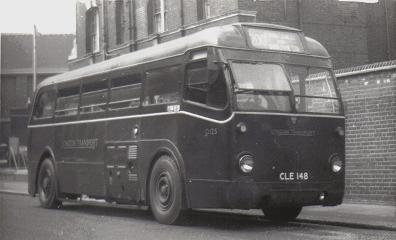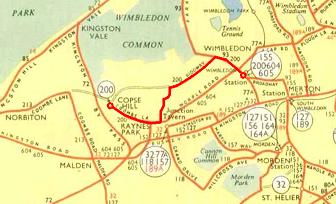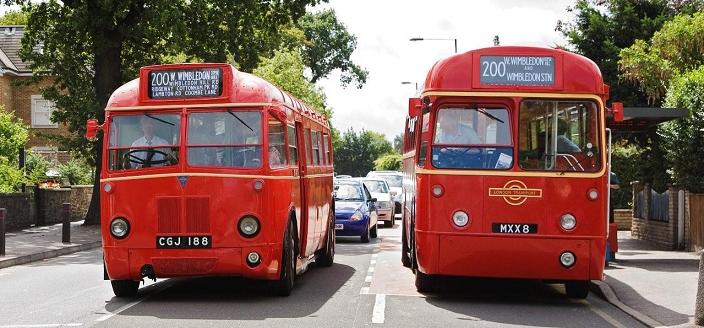|
|
 Red RF routes Red RF routes
Route 200
Page last updated 23 January
2016
Among the first routes to be converted to RFs, the 200 was
double-decked in 1965 after local opposition to double-deckers was
finally overcome.
Fresh from overhaul in
1961, RF398 has just dropped its passengers at Wimbledon Station
and heads off to the stand at the Police Station.
Photo Peter Gomm
collection
Dates of RF operation
1 Dec 52 to 24 Aug 65
(total 12 years, 9 months, all crew operation).
Destinations
WIMBLEDON STATION and COOMBE LANE (to 2 Jan 62)
WIMBLEDON STATION and RAYNES PARK STATION (from 3 Jan 62)
Reason for single-deck operation
There were no low bridges on the route, but residents of the
smart suburb of Wimbledon objected to double-deck buses operating
on their roads. The route was double-decked when opposition
was finally overcome in 1965.

After a post-war repaint,
Q125 sits on the Police Station stand in Wimbledon
Photo Peter Gomm
collection
Route history
Introduced by the General in September 1930 as the 103, the
route initially ran between Wimbledon Station and Raynes Park and
used a single K-class single-decker from Merton (AL), which at the
time also operated single-deck routes 87 (later 234) and 155 B (later 245). This was replaced by an S two months
later, and the allocation doubled to increase the service the
following year. The Ss were replaced by two new LTL Scooters
in summer 1931. The route was renumbered 200 in the 1934 renumbering.
Converted to new side-engined 5Q5s in April 1936, the route
was extended the following month to serve Coombe Lane Copse
Hill - always known on the blinds as 'W Wimbledon' - where it
terminated by making a U-turn at the junction. This doubled
the allocation to 4, increasing again to 6 for an increased service
in 1943. The Qs continued in service throughout the war,
temporarily supplemented by Ts in the winter of 1943/4 for the
service increase.
Loaned by Green Line,
10T10 T525 sits on the Wimbledon stand on 14 Apr
51. This was during the difficult period while the RFs were
awaited (indeed, it was the very day that the first RF was licensed), and both Central and
Country Areas were 'making do' as best they could. Photo © Alan Cross,
Peter Gomm collection
London Transport would have liked to apply their normal policy
of double-decking the route, but the local residents' association
was having none of it. So the busy route was was one of the
first to be converted to RF operation, using new buses in
1952. The first 3 buses were licensed on 1 Dec 52, with
conversion completed by 12th.
The 200 was cut back to its original terminus Raynes Park
Station (complete with one-way working) in 1962, the remainder
being covered by an extension to Kingston of
recently-introduced RT route 286. In January 1964, the 286 was withdrawn
except on Sundays and the 57 was extended to Kingston in its place
(the 57 now covers that section of the route daily). The
Sunday service was lost that November when the 286 was withdrawn
and Coombe Lane was unserved on Sunday until the later extension of
the 200.
Residents overcome, the 200 was finally double-decked
with RTs on 25 Aug 65. Two months later, the route was
extended to Kingston on Sunday afternoons, an extension that lasted
only as long as the RTs. On the last day of 1966, the route
was extended to Mitcham Fair Green via Haydons Road and
became the first route to serve the Phipps Bridge Estate.
30 Jan 71 saw the route converted to one-man operation
with SMSs, and in 1973 the double-run to
serve Atkinson Morley Hospital was introduced, bringing
the route into its current form. Between 1981 and 1995, a
variety of eastward extensions were introduced, to Wallington,
Streatham and (temporarily) Tulse Hill, none
surviving.
In 1977, the route was again double-decked using DMSs, later
Ds, until the introduction by London Regional Transport of route
tendering in 1985/6. The first operator, London Cityrama,
asked to be relieved of the route in November 1988 following
vehicle unreliability, and it was temporarily placed with Kingston
Bus from Norbiton garage before a new contract was let to London
General.
General (in the guise of Sutton Bus) operated the route from
the Colliers Wood outstation (AA) using Ms and Ds, introducing
midi-buses on Sundays in 1992 before conversion to single-deck
Darts in 1995 (with double-deck school journeys using
Metrobuses).
But that wasn't the end of the travails of the route. In
2000, the route tender was won by Mitcham Belle, who became
notorious for poor service, a situation not redeemed by takeover by
Centra. The route was taken back by TfL in 2006 and returned
to London General at Merton.
 RF route in
detail RF route in
detail, with timing points
WIMBLEDON STATION, Wimbledon Hill Road, The Ridgeway,
The Ridgeway Christ
Church, Cottenham Park Road, Pepys Road, Cambridge
Road, Lambton Road, Raynes Park
Raynes Park Hotel, Coombe Lane, COOMBE LANE Copse
Hill (to 2 Jan 62)
From the 1955 bus map © London
Transport
WIMBLEDON STATION, Wimbledon Hill Road, The Ridgeway,
The Ridgeway Christ
Church, Cottenham Park Road, Durham Road, Coombe Lane,
RAYNES PARK STATION, return via Lambton Road, Cambridge Road, Pepys
Road to Cottenham Park Road (from 3 Jan 62)
Garage journeys: from AL, Merton High Street, Merton Road, The
Broadway to Wimbledon Station
Terminal working at Wimbledon: Queens Road, South Park
Road (stand at Police Station), return via Kings Road and The
Broadway.
Frequency
| Year |
Mon-Fri |
Sat |
Sun |
| 1936 |
10 mins* |
10 mins |
10 mins |
| 1941 |
10 mins* |
10 mins |
15-30 mins |
| 1946 |
10 mins |
7½-10 mins*
|
10-20 mins* |
| 1951 |
7-10 mins |
7½ mins |
12-15 mins |
| 1959 |
10-15 mins |
8-15 mins |
20 mins |
| 1964 |
10-18 mins |
10 mins |
18-36 mins |
* Including short workings between Wimbledon Station and
Raynes Park.
From Wimbledon Station, the route took about 12 minutes to
reach Raynes Park and 16 minutes to reach Copse Hill. The
1959 timetable is here (thanks to Roger
Newport for scanning these).
Faretable
To view the faretable for May 1965, the last applying
to RF operation and including garage journeys, click
here.
RF allocation
New RFs delivered Dec 52: 354-356, 368, 370-1, 373 (6 + 1
spare)
PVR 1952 (Dec): Mon-Fri 6, Sat 6, Sun 5
PVR 1953 (May): Mon-Fri 6, Sat 6, Sun 4
PVR 1958 (Apr): Mon-Fri 5, Sat 5, Sun 5
PVR 1958 (Nov): Mon-Fri 4, Sat 5, Sun 3
PVR 1962 (Jan): Mon-Fri 3, Sat 3, Sun 2
Robert Bowen was a driver
at Merton, briefly on RFs:
My encounter with the RF was brief as the 200 route was
converted to RT not long after I started on LT. Having passed out
on an RTW, I had to do 2 days type training on the RF type; the
vehicle allocated was a Green Line bus. My instructor
Wally was an ex-Sutton driver and most of our training was
done on country routes. My approval /test was carried out in the
back streets of Chiswick and Acton, the gold badge instructor that
conducted my approval/test being an ex-Merton driver named Tom
Cooper who resided at Shannon’s Corner, New Malden.
I started at Merton (AL) garage on 27 Mar 65 on the only single
deck route, the 200, operated by the RF type (all other AL routes
were RT operated) which ran between Wimbledon Station and Raynes
Park. The Raynes Park terminus was in Lambton Road and buses
entered Raynes Park via Durham Road and Coombe Lane and left via
Lambton Road, Cambridge Road and Pepys Road rejoining the inward
route at Cottenham Park Road. Buses discharged passengers on
Wimbledon Bridge and continued via Queens Road to the stand in
South Park Road alongside Wimbledon Police Station. Crews were
allowed to use the Police canteen for a quick tea break until it
was stopped - the rumour being that a clippie named Big Janet was
trying to chat up the male PCs (that may or may not be true!).
Buses departed via Kings Road and Wimbledon Broadway, the first
pick up being outside Safeway.
There were no short turns on the 200 - if you were late, you
just kept going until eventually you got back on time, having
probably missed a journey or two. The 200 was rostered with RT
routes 57 and 118, the majority of the latter being allocated to
Streatham (AK) garage. Soon after I started, [on 25 Aug 65]
double-deck RTs took over the route, which caused much disquiet
among the nobs along the Ridgeway, Wimbledon, and it was extended
to Mitcham Three Kings. Then in the early seventies came
the single-manning of the route and the infamous SMS type, drivers
hated the route and some with a good few years service left the job
or transferred to other departments.
One thing I remember about the route was that one of our regular
passengers was actor Michael Robbins, who played Stan’s
brother-in-law Arthur Rudge in the hit comedy On The Buses. He
lived up the Ridgeway and used to travel between there and
Wimbledon Station.
Re-creation
Route 200 was recreated at our Worcester
Park running day in 2008. RFs will operate again on 2 Dec
2012 to mark the 60th anniversary.

Cobham's Q83 and Jim Andress's RF366 working
the 200 in 2008.
Photo © Peter Zabek
|
|